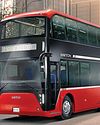
Bus manufacturers are banking on a new rule that allows easier inter-state travel permissions to boost demand for buses. In an interaction with Autocar Professional, Akash Passey, President (Bus Division), Volvo Eicher Commercial Vehicles (VECV) said that with schools normally closing around April-May each year for summer vacations, he expects tourism to pick up. He also says that this depends on there being no additional pandemic wave hindering normal movement of people across the country.
It is, however, the regulatory changes in taxation for interstate tourist buses which may lower the costs of a bus for operators and lead to lower fares that he says may help the sector get a much-needed boost.
As per industry rules, the taxes on interstate buses are determined by the number of seats or berths in the vehicles. A back-of-the envelope calculation based on this may help understand the taxstructure for the tourist bus operators vis-a-vis the older one. For instance, when an inter-state bus earlier travelled between Mumbai to Bengaluru covering around 600 kilometers and passing through Maharashtra and Karnataka, both the states levied approximately Rs 28,000 and Rs 59,200 of taxes respectively. However, under the new all-India permit rules, the charges levied by Maharashtra remain the same at around Rs 28,000, but the remaining charges come down drastically to Rs 25,000, thereby cumulatively adding up to just about Rs 53,000 which is a clear saving of nearly Rs 35,000 as compared to the earlier structure.
As an example, if a bus travels from Bengaluru to Hyderabad covering over 700 km, thereby transitioning through Karnataka and Andhra Pradesh before reaching Telangana, the earlier levies that would be approximately total Rs 158,400 would be nearly halved which amounts to a big savings for bus operators especially in current times when pandemic has eaten into their businesses.
この記事は Autocar Professional の 1st March 2022 版に掲載されています。
7 日間の Magzter GOLD 無料トライアルを開始して、何千もの厳選されたプレミアム ストーリー、9,000 以上の雑誌や新聞にアクセスしてください。
すでに購読者です ? サインイン
この記事は Autocar Professional の 1st March 2022 版に掲載されています。
7 日間の Magzter GOLD 無料トライアルを開始して、何千もの厳選されたプレミアム ストーリー、9,000 以上の雑誌や新聞にアクセスしてください。
すでに購読者です? サインイン

Spain's Fersa Group invests in India-based Delux Bearings
Besides theRs100 croreinvestment, the Indian company gets access toadvanced technologies and bearings with arange of applications that willhelpinits global growth strategy, writes Manobhava Baruah.

Tata Autocomp to open compact dual-clutch transmission plant
Amidthe country’s growing need for personal mobility with easy manoeuvrability, comes the demand for vehicles with automatic transmission. Tata AutoCompisready tomovein writes Shruti Mishra.

Pankaj Munjal-backed Hero Motors raises equity from GEF Cap
The company willinvest Rs1,500 crore over thenextthree years andit expects 60 percent ofits turnover to come fromelectric vehicle parts. Itaims to becomea Global EV Solutions Company from India

New age thermoplastics for next-generation EV batteries
Saudi-based global materials major SABIChas developed cutting edgein fire-resistant polymers and flame-retardant materials that comply with various EV battery safety standards across the world.

Switch Mobility to meet growing e-bus demand with fresh capex
Oncourse for abillion-dollar business, the company is exploringa possibility of operating satellite factories across the country to serve different geographies, write ShahkarAbidi and Ketan Thakkar.

Kia India to invest Rs 2,000 crore in EVS, to introduce new e-RV in 2025
New investmentto drive R&D, infrastructure development and manufacturing capabilities. The company willlocally produce EVsin India with possibility of exports as well, writes Mayank Dhingra.

"The government has given enough time for indigenisation but the industry has not taken it seriously"
Amitabh Saran, Founder and CEO, Altigreen, shares his views on problems inthe EV industry and battery localisation solutions with Amit Vijay M.

TATA MOTORS SEES ONE INTWO CARS SOLDAS EVS BY 2030
The company aims to offer wider choices withnew EVs that may straddle a pricebracket of Rs20to 40lakhinthe coming years, writes Ketan Thakkar.

MG Motor India in expansion drive, to invest $100 million
The investment willbe usedtoramp up existing production capacity from1.2to1.4-15lakh units per annum atthe automaker's Halol plantin Gujarat, writes Ketan Thakkar.

"Technology and its multiplier effect are driving business transformations and customer experiences"
Technical Centre India is one of Continental’s largest research and development centres in the world, andasa Centre of Competence’ it also develops customised products for the BRIC countries.